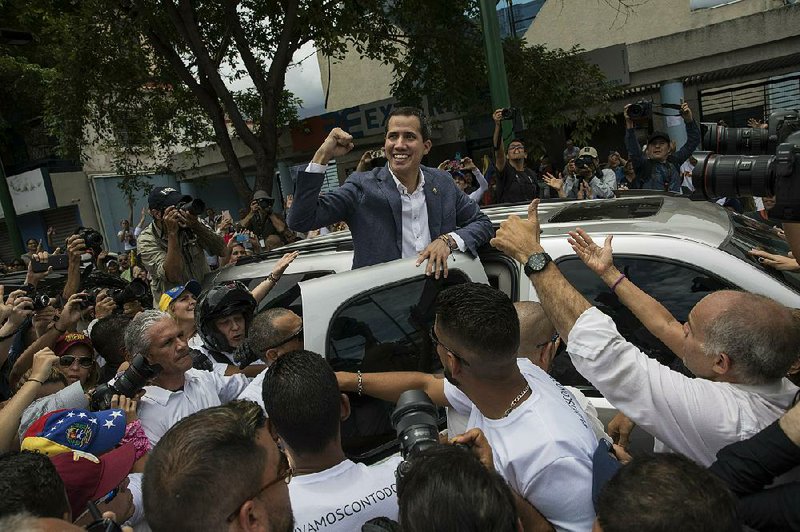CARACAS, Venezuela -- Venezuelan opposition leader Juan Guaido on Saturday said he has instructed his political envoy in Washington to immediately open relations with the U.S. military in a bid to put more pressure on President Nicolas Maduro to resign.
Guaido said he asked Carlos Vecchio, whom the U.S. recognizes as Venezuela's ambassador, to open "direct communications" toward possible military "coordination."
The remarks, made at the end of a rally Saturday, mark one of Guaido's strongest public pleas for greater U.S. involvement in the country's escalating crisis.
Although Guaido has repeatedly echoed comments from President Donald Trump's administration that "all options" are on the table for removing Maduro, few in the U.S. or in the Venezuelan opposition view military action as likely, nor has the White House indicated it's seriously considering such a move. Latin American countries have repeatedly rejected the idea of military intervention by the U.S.
But with tensions between the U.S. and Maduro running high, the saber-rattling is getting louder.
Guaido has stopped short of openly calling for an invasion, though he has increasingly floated the idea as an option as the opposition faces an aggressive crackdown from the Maduro regime.
On Friday, he told Italy's La Stampa newspaper that he "would probably accept" an intervention if the U.S. proposed it.
On Saturday, Venezuelan Defense Minister Vladimir Padrino condemned what he said was an illegal incursion by a U.S. Coast Guard cutter into Venezuelan territorial waters. He provided no evidence to back the claim but said that Venezuelan naval vessels forced it to withdraw.
"I don't know if other republics will accept actions like this in their jurisdiction, but we will not," he said.
Army Col. Amanda Azubuike, a Southern Command spokeswoman, said a U.S. Coast Guard vessel was conducting a drug interdiction mission in the international waters of the Caribbean Sea. She declined to provide further comment.
Previously, Padrino also denounced what he said were attempts by the U.S. military to sow discord inside Venezuela's barracks, inviting an angry response from U.S. Navy Adm. Craig Faller, the head of Southern Command, who said he "stands ready" to assist Guaido.
"I look forward to discussing how we can support the future role of those [leaders of the Venezuelan armed forces] who make the right decision, put the Venezuela people first & restore constitutional order," said a post on the Southern Command's Twitter account.
As head of Venezuela's opposition-led National Assembly, Guaido launched a campaign in January to oust Maduro, gaining the support of the U.S. and more than 50 nations.
Guaido on Saturday announced a forthcoming meeting with U.S. military officials and said that new actions taken by the opposition will seek to "achieve the necessary pressure" to put an end to the Bolivarian revolution launched 20 years ago by the late socialist Hugo Chavez.
Guaido has declared himself interim president of Venezuela, arguing that Maduro illegitimately won a second term in rigged elections.
Guaido said that as Venezuela's rightful leader, he reserves the right to invite foreign military actions in the same way that independence hero Simon Bolivar hired 5,000 British mercenaries to liberate South America from Spain. He said any such help should be considered "cooperation" instead of intervention, something he has accused Maduro of allowing in the form of military and intelligence support from allies Cuba and Russia.
In recent days, the government has sought to ramp up its pressure on the opposition with the arrest of the No. 2 leader of the National Assembly, Edgar Zambrano. Several other anti-Maduro lawmakers have sought refuge in the embassies of foreign nations as the country's top court announced investigations of Zambrano and nine other members of congress.
Against that backdrop, Guaido's call for major street demonstrations Saturday drew meager crowds.
The noticeably diminished crowds at opposition protests reflected a growing fear and demoralization that has permeated Guaido's ranks of supporters after he unsuccessfully attempted to lead a military uprising April 30. In previous months, thousands of demonstrators have heeded his calls to protest.
On Saturday, a modest crowd of several hundred Venezuelans gathered in the capital, Caracas.
"We live in dictatorship," Guaido said, urging his supporters to press forward in their campaign to oust his foe. "We don't have the option to stay at home waiting, but to keep demanding our rights in the streets."
Maduro has maintained control of the military by securing the loyalty of top commanders. He calls Guaido a "puppet" of the Trump administration and says that the U.S. is supporting a coup to exploit the country's vast oil wealth.
"The U.S. Empire aims to end the Bolivarian Revolution," Maduro tweeted early Saturday, boasting of the country's education and social security systems. "We show the world that we can do social justice."
A once-wealthy oil nation, Venezuela has sunk into economic and social collapse marked by soaring inflation and a scarcity of basic goods. The crisis has led an estimated 3.7 million of its citizens to emigrate.
Information for this article was contributed by Scott Smith of The Associated Press and Ezra Fieser and Andrew Rosati of Bloomberg News.
A Section on 05/12/2019
